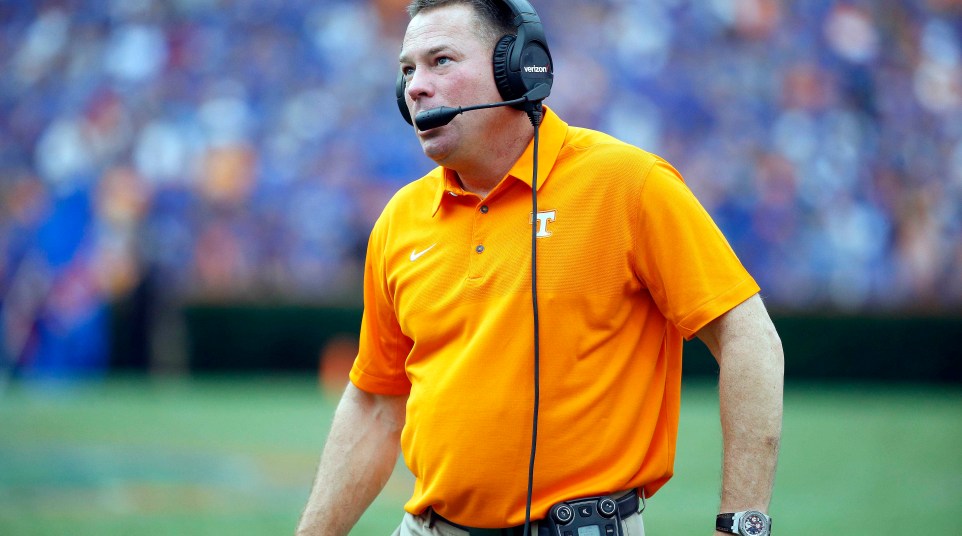
Back to the future: Butch Jones' goal-line decisions again topic of discussion
KNOXVILLE — It’s back to the future for Butch Jones and his Tennessee Volunteers following a last-second loss at Florida.
During the 26-20 defeat, Jones’ offense faced goal-line questions and only scored a combined three points on its three trips to the red zone.
In the third quarter, on 1st-and-goal near the 1-yard line, quarterback Quinten Dormady threw to wide receiver Marquez Callaway. Florida’s defense stacked the box, but Dormady missed.
“It was a check,” Jones said. “They (Florida) were all-out cover zero. We liked what we had. But, again, it gives you a chance at second down, and then you can’t have a penalty.”
An unsportsmanlike penalty against Florida gave Tennessee another chance at 1st-and-goal from the 1. Backup quarterback Jarrett Guarantano entered for the second opportunity to punch it for a touchdown at the goal line.
OL Jack Jones jumped early. The false start pushed the Vols back past the 5. Out went Guarantano with the penalty, in came Dormady.
Again the Vols did not hand off to John Kelly.
Butch Jones on the Florida loss
Jones said the Vols were “running the ball effectively at that point in time,” but his focus was on a short field and questioned if running the ball was the best option.
“When the field shrinks, the defenses that you see change, as well,” he said.
This time, Dormady missed Josh Palmer. On 2nd-and-goal, Dormady completed a screen pass to Kelly for a loss of one yard. Then the third down play turned disastrous. Dormady, expecting Palmer to run a slant, threw over the middle. Florida’s Duke Dawson reached back and made a difficult interception.
Jones was candid about the events that unfolded in a 6-3 game when points were at a premium.
“That can’t happen on the goal line,” he said. “You have 1st-and-goal on the 1, we need to score. We had a run play called, and they were a 70 percent heavy-pressure football team of all-out cover zero blitz, so they have a couple gaps that they have a couple individuals that you can’t account for in the run scheme. We knew that going in.
“Would we have liked to run the football there? Absolutely. The plan was on second down to get underneath center and do a quarterback sneak or run the football outside. Quinten tweaks his knee, and we didn’t think it was fair for Jarrett to have to go into the game and do an underneath-center snap when he didn’t have time to practice the underneath-center snap.
“There’s a lot of nuances that occurred through the course of those two plays, but make no mistake about it, we get the ball down there, we need to run the football and we need to score touchdowns.”
Here's Tim's descent into madness as it unfolds over the series. 1:35 is the swelling "Dammit!" pic.twitter.com/ashCOKobGV
— Luke Slabaugh (@LukeWBIR) September 17, 2017
These heat-of-the-moment plays at the goal line have been a topic of discussion during Jones’ tenure.
In the first quarter of a home game against Oklahoma in 2015, Jones elected to take three points at the 1-yard line instead of setting the tone in an electric checkered Neyland Stadium.
“Football’s a game of momentum,” Jones said following the Oklahoma game. “You don’t want all-or-nothing plays at the beginning of the game. We just felt we needed to get on the board, get some confidence, and get some points.”
Jones also stated that the decision to kick the field goal instead of attempting to pound the ball in from the 1-yard line and allow Oklahoma to have the length of the field to deal with was based off analytics.
“We do everything based on analytics, so nothing is taken by chance,” he said. “Probably about four or five hours went into that single decision. You can always second guess, but I don’t second guess because a lot of diligence and effort went into that decision.
“Unfortunately, we came up short. It’s football. We have to get better. That’s on me as the caretaker.”
In Jones’ most previous trip to The Swamp before Saturday’s 26-20 defeat, Jones elected to not go for a two-point conversion while ahead 26-14 in the fourth quarter; Florida scored 14 unanswered points and won by one in 2015.
Jones’ explanation was again due to a “number of reasons” that he was “discussing prior to that (scoring) drive.”
And his on-field chart played a factor.
“If we did score, whether we go for one or two, we have a chart that is pretty standard in football, first of all and maps it all,” he said. “We just felt like at that stage in the game that we had great confidence in our defense of getting off the football field and allowing them to push the ball down the field, so we felt very comfortable with the decision.”
These decisions have played a factor in three important games that could have set a tone early on in each season.
Like in 2015, Tennessee will have to bounce back emotionally so the season does not go south.
“We all hurt. We are angry. We are pissed,” Jones said. “Now it’s what we make of it. How do we become better because of this?
“Sometimes there are situations like this, where you suffer the adversities of a long football season and they can galvanize you. It can bring you closer together as a football team. We must get back to work.”
